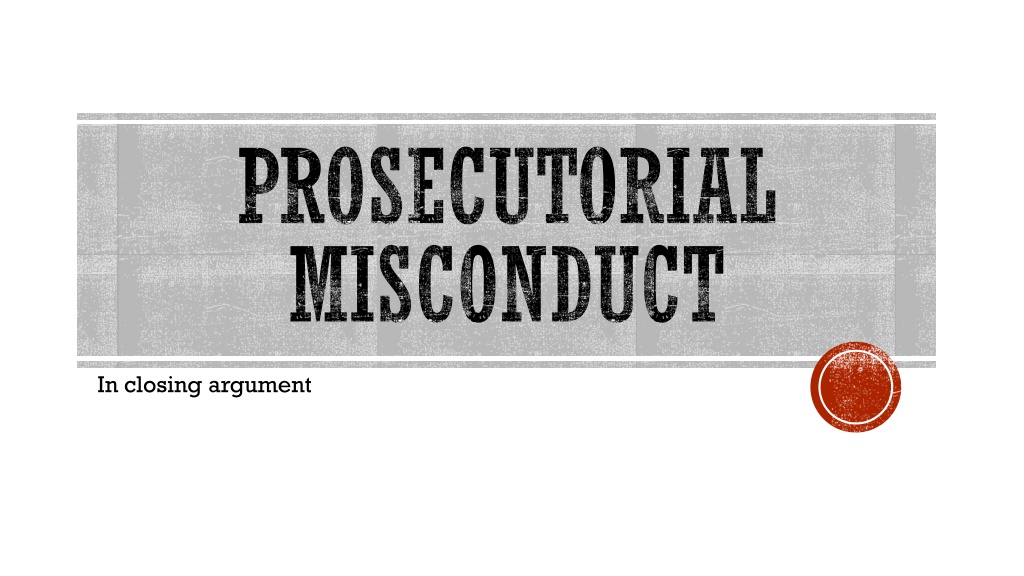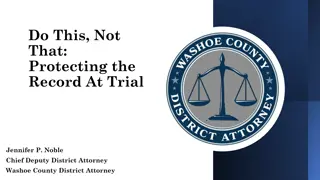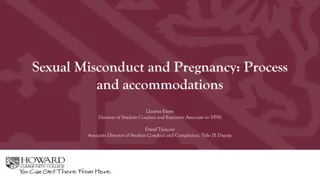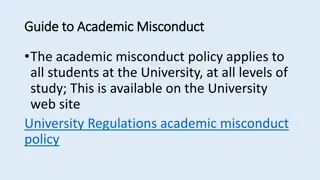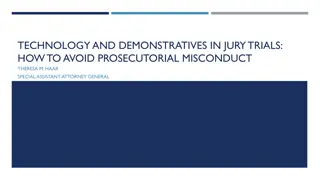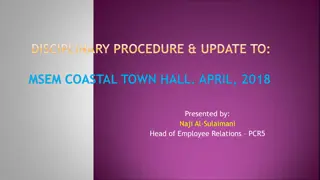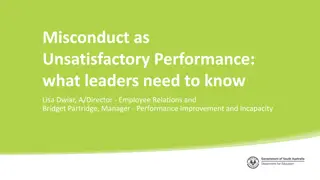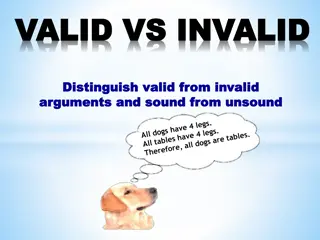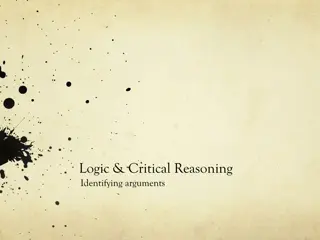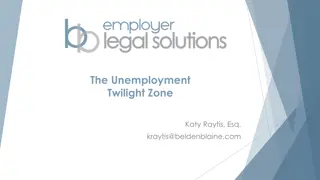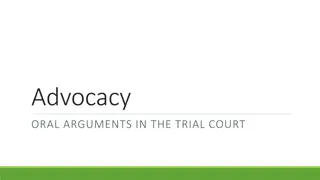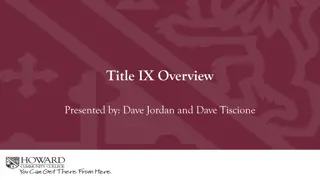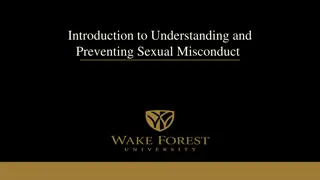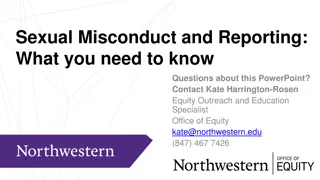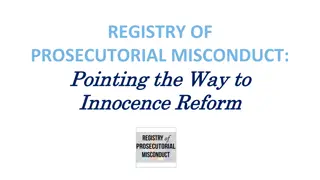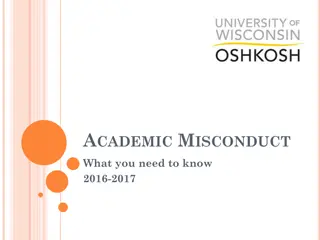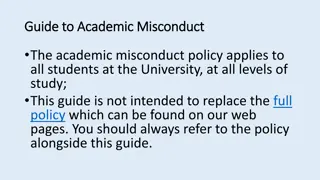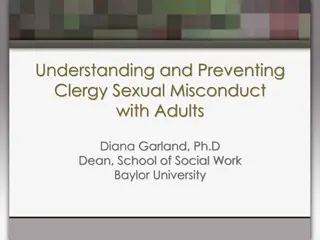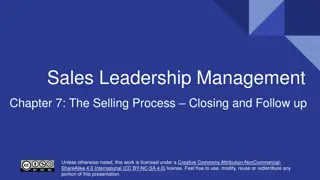Understanding Prosecutorial Misconduct in Closing Arguments
Explore the duty and obligations of prosecutors in presenting evidence fairly, the prevalence of prosecutorial misconduct, and the impact on legal proceedings. Learn about vouching, different types of prosecutorial misconduct in closing arguments, and key legal cases defining the boundaries of prosecutorial conduct.
Download Presentation

Please find below an Image/Link to download the presentation.
The content on the website is provided AS IS for your information and personal use only. It may not be sold, licensed, or shared on other websites without obtaining consent from the author. Download presentation by click this link. If you encounter any issues during the download, it is possible that the publisher has removed the file from their server.
E N D
Presentation Transcript
PROSECUTORIAL MISCONDUCT In closing argument
DUTY OF THE PROSECUTOR The duty of the district attorney is not merely that of an advocate. His duty is not to obtain convictions, but to fully and fairly present the evidence . (People v. Kasim (1997) 56 Cal.App.4th 1360, 1378.)
DUTY OF THE PROSECUTOR Prosecutors have a special obligation to promote justice and the ascertainment of truth (Kasim)
PROSECUTORIAL MISCONDUCT Research shows police and prosecutorial misconduct occurred in as many as 60% of wrongful conviction exonerations** **Source: National Registry of Exonerations Report (2017)
PROSECUTORIAL MISCONDUCT PROSECUTORIAL MISCONDUCT NEED NOT BE INTENTIONAL OR EVEN MADE IN BAD FAITH. (PEOPLE V . ALVAREZ (1996) 14 CAL.4TH 155, 213.)
PROSECUTORIAL MISCONDUCT IN CLOSING ARGUMENTS: HERE IS WHAT WE ARE DEALING WITH NO PREJUDICE CONSIDERING STRENGTH OF THE EVIDENCE (PEOPLE V . FAYED (2020) 9 CAL.5TH 147) HARMLESS WHEN IMPROPER STATEMENTS ARE ONLY SMALL OR BRIEF PART OF DA ARGUMENT (PEOPLE V . LIMA (2020) 49 CAL.APP.5TH 523; PEOPLE V . CARO (2019) 7 CAL.5TH 463; PEOPLE V . SANCHEZ (2019) 7 CAL.5TH 14.) FORFEITURE WHEN DEFENSE DOES NOT TIMELY OBJECT TO THE STATEMENTS AND REQUEST ADMONITION (PEOPLE V . RIVERA (2019) 7 CAL.5TH 306) FOR CLOSING ARGUMENTS, PROSECUTORS ARE GIVEN WIDE LATITUDE TO ARGUE THEIR CASES. (PEOPLE V . PEOPLES (2016) 62 CAL.4TH 718.)
PROSECUTORIAL MISCONDUCT IN CLOSING ARGUMENTS Closing arguments are a critical stage of jury trial Defense counsel and prosecuting officials do not stand as equals before the jury. Defense counsel are known to be advocates for the defense. (People v. Talle (1952) 111 Cal.App.3d 650, 677-678.) [Prosecutors] are government officials and clothed with the dignity and prestige of their office. What they say to a jury is necessarily weighted with that prestige. (Id.)
In this training Different types of prosecutorial misconduct in closing arguments
VOUCHING Vouching occurs when prosecutors directly or indirectly suggest that they believe the witnesses, and so should the jurors. These statements can be dynamite to the jury because of the special regard the jury has for the prosecutor. (People v. Bolton (1979) 23 Cal.3d 208, 213.) Prosecutor may not offer an opinion on the credibility of a witness based on his or her own experience or on other facts outside the record. (People v. Huggins (2006) 38 Cal.4th 175, 206.)
People v. Rodriguez (2020) 9 Cal.5th 474 NO MOTIVE TO LIE? No motive to lie? Ok They ve been cops for 22 years Ok Officers would not risk their careers Record does not contain any direct or circumstantial evidence about whether the officers would put their entire career on the line or at risk by giving false testimony. (p. 481) DA argument here based upon matters outside the record that were not subject to cross-examination. (Id.)
DISPARAGING DEFENSE COUNSEL DA MAY NOT ALLEGE DEF CSL IS VILLAIN FOR ATTACKING VICTIM (PITTS (1990) 223 CAL.APP.3D 606.) (W/O EVIDENCE), DA CANNOT ALLEGE DEF CSL FABRICATED DEFENSE (BAIN (1971) 5 CAL.3D 839, 847) OR INSTRUCTED CLIENT TO LIE (HERRING (1993) 20 CAL.APP.4TH 1006.) IMPROPER TO INSINUATE DEF CSL S OBJECTION IS BECAUSE HE WANTS TO HIDE INFO FROM THE JURY. (PEOPLE V. VANCE (2010) 188 CAL.APP.4TH 1182.)
DISPARAGING DEFENDANT Imprudent for prosecutor to comment that defendant s appearance in court was extremely deceiving and he was sitting there looking like a pitiful excuse for a human being. (Vance.) Misconduct to suggest defendant is duplicitous based on his courtroom demeanor. (People v. Boyette (2002) 29 Cal.4th 381.) Name calling that refers to facts outside of the record can also be misconduct. (People v. Sanchez (2014) 228 Cal.App.4th 1517 [defendant would go home and laugh at the jury].) Misconduct to suggest defendant should be punished because of the group with whom he associates or because of some uncharged and unspecified crimes the defendants or others may have committed. (People v. Arredondo (2018) 21 Cal.App.5th 493.)
DISPARAGING DEFENDANT THE CLEAR MESSAGE CONVEYED BY THE PROSECUTOR'S REPEATED REFERENCE TO THE DEFENDANTS AND APPARENTLY THE OTHER PARTICIPANTS AS COCKROACHES IS THAT THIS GROUP OF INDIVIDUALS IS NOT ENTITLED TO ANY INDIVIDUAL CONSIDERATION OR JUSTICE, BUT MUST BE VIEWED AS A DISGUSTING GROUP WHICH POSES AN ONGOING THREAT TO THE ENTIRE COMMUNITY. (ID.)
FACTS NOT IN EVIDENCE The office of the prosecution carries such weight with a jury that his statement of fact predicated on his knowledge, rather than on the evidence, constitute reversible error. (People v. Purvis (1963) 60 Cal.2d 323, 341.)
FACTS NOT IN EVIDENCE Prosecutor stated he did not call another cop to testify because that testimony would be the same as the cop who did testify. (Hall (2000) 82 Cal.App.4th 813.) Prosecutor stated what the answer to a question would if he had asked it. (Johnson (1981) 121 Cal.App.3d 94.) Without evidence, prosecutor argued the reason a witness waited a long time to come forward to authorities was because she was afraid for her life. (Kirkes (1952) 39 Cal.2d 719.) Prosecutor discussed his experience as a basis for assessing the testimony and egregiousness of the crime. (Mendoza (2007) 42 Cal.4th 686.)
BURDEN SHIFTING OR LOWERING DA BURDEN MISCONDUCT FOR THE PROSECUTOR TO ADVISE THE JURY THAT [DEFENDANT] BORE SOME BURDEN OF PROOF OR PERSUASION. (WOODS (2006) 146 CAL.APP.4TH 106.) MISCONDUCT FOR DA TO SUGGEST THAT SHE DID NOT HAVE THE BURDEN OF PROVING EVERY ELEMENT OF THE CRIMES CHARGED BARD. (PEOPLE V . HILL (1998) 17 CAL.4TH 800, 831-832 [DA S STATEMENTS IN CLOSING ARGUMENT THAT THERE HAS TO BE SOME EVIDENCE ON WHICH TO BASE A DOUBT SUGGESTED THERE MUST BE SOME AFFIRMATIVE EVIDENCE DEMONSTRATING A REASONABLE DOUBT.)
CONFLATING CIRCUMSTANTIAL EVIDENCE WITH REASONABLE DOUBT (OR INCORRECTLY ARGUING CIRCUMSTANTIAL EVIDENCE) DA CONFLATES PROOF BARD BY ARGUING IT IS SHOWN BY THE REASONABLENESS OF THE PROOF. (PEOPLE V . CENTENO (2014) 60 CAL.4TH 659.) DA ARGUED CIRCUMSTANTIAL EVIDENCE ONLY APPLIES TO ACTUAL INNOCENCE, NOT LIO. (PEOPLE V . DOANE (CAL. CT. APP., JULY 22, 2021, NO. A153709 [2021 WL 3087580].)
TRIVIALIZING REASONABLE DOUBT [T]inkering with the explanation of reasonable doubt is a voyage to be embarked upon with great care. (Centeno.) [Trivial decisions] involve a kind of casual judgment that is so ordinary and mundane that it hardly matches our demand for near certitude of guilt before attaching criminal culpability. (US v. Velazquez (9th Cir. 2021) 1 F.4th 1132.)
TRIVIALIZING REASONABLE DOUBT IT IS MISCONDUCT FOR A PROSECUTOR TO TELL JURORS THAT THEY APPLY A REASONABLE DOUBT STANDARD EVERY DAY TO DECISIONS. (PEOPLE V. NGUYEN (1995) 40 CAL.APP.4TH 28; VELAZQUEZ.) EXAMPLES WHERE PROSECUTORS HAVE BEEN FOUND TO TRIVIALIZE REASONABLE DOUBT: EATING A MEAL THAT MIGHT MAKE YOU SICK (VELAZQUEZ) DRIVING TO COURT (VELAZQUEZ) CHANGING LANES WHILE DRIVING (NGUYEN) MARRIAGE (NGUYEN) DIAGRAM/PUZZLE OF THE STATE OF CALIFORNIA (CENTENO + OTERO) PUZZLE W/ MISSING PIECES (KATZENBERG)
TRIVIALIZING REASONABLE DOUBT People v. Centeno (2014) 60 Cal.4th 659 Prosecutor showed puzzle/diagram and discussed facts about California and told the jurors that they could determine that it was an outline/puzzle of California. Cal Supremes reversed, finding the da s example was not based on evidence presented at trial and not analogous to the facts of the case. Also conflates CE and proof BARD (more later).
TRIVIALIZING REASONABLE DOUBT People v. Katzenberger (2009) 178 Cal.App.4th 1260 Da misconduct because use of readily recognizable icon suggests jurors could convict on lesser evidence than what is required of reasonable doubt Missing puzzle pieces (2 out of 6 missing) would equate to 75% - improper quantitative measure
APPEAL TO PASSION/SYMPATHY IN JURORS It is, of course, improper to make arguments to the jury that give it the impression that emotion may reign over reason, and to present irrelevant information or inflammatory rhetoric that diverts the jury s attention from its proper role, or invites an irrational, purely subjective response. (People v. Redd (2010) 48 Cal.4th 691, 742- 743.)
APPEAL TO PASSION/SYMPATHY IN JURORS Prosecutors may not urge a jury to convict in order to protect community values, preserve civil order, ensure law-abiding behavior, or deter future lawbreaking. Improper to appeal to jury to take Mr. Mendoza off the streets. (People v. Mendoza (1974) 37 Cal.App.3d 717, 727.) Improper to tell jurors they should consider the effect of their verdict on the community. (People v. Hail (1941) 25 Cal.App.342, 357-358.) Improper for prosecutor to implore jury to render a verdict such as you will be proud of. (People v. Adams (1939) 14 Cal.2d 154, 161-162.)
In [the golden rule] criminal variation, a prosecutor invites the jury to put itself in the vic s position and imagine what the vic experienced. This is misconduct because it is a blatant appeal to the jury s natural sympathy for the vic. (Vance.) Prosecutor told jurors to imagine what it would be like to be shot and choking and trying to get your last breath out while blood is gurgling in your lungs (Amezcua (2019) 6 Cal.5th 886) THE GOLDEN RULE
MISSTATING THE LAW Error to incorrectly describe voluntary manslaughter as a legal fiction. (People v. Najera (2006) 138 Cal.App.4th 212) Error to misstate law on reasonable person standard for manslaughter. (People v. Mendoza (2007) 42 Cal.4th686) Prosecutor s false statements that defendant would be eligible for parole on an LWOP sentence denied defendant a fair trial (Sechrest v. Ignacio (9th Cir. 2008) 549 F.3d 789) Error for DA to tell jury that the fear element in a robbery case involves an objective standard when it is actually subjective. (People v. Collins (2021) 65 Cal.App.5th 333.) Repeated, pervasive comments, (called the subjective standard ridiculous ), close issue
SANDBAGGING IN REBUTTAL It does not permit the prosecutor to give a perfunctory (three and one- half reporter transcript pages) opening argument designed to preclude effective defense reply, and then give a "rebuttal" argument- immune from defense reply-10 times longer (35 reporter transcript pages) than his opening argument. (Robinson (1995) 31 Cal.App.4th 498.)
AND A BONUS: MISSTATING PRESUMPTION OF INNOCENCE It is misconduct to misinform the jury that the presumption of innocence is gone prior to the jury s deliberations. It strikes at the very heart of our system of criminal justice. Even a novice prosecutor should know not to make such a fallacious statement to the jury. (People v. Cowan (2017) 8 Cal.App.5th 1152, 1159.) Misconduct to tell jury that presumption lifts when first witness testifies. (People v. Roberts (2021) 65 Cal.App.5th 469.)
OBJECTION/ADMONITION DOES NOT CURE ALL PREJUDICE It is better to follow the rules than to try to undo what has been done. Otherwise stated, one cannot unring a bell ; after the thrust of the saber it is difficult to say forget the wound ; and finally, if you throw a skunk into the jury box, you can t instruct the jury not to smell it. (Dunn v. United States (5th Cir. 1962) 307 F.2d 883.) The na ve assumption that prejudicial effects can be overcome by instructions to the jury, all practicing lawyers know to be unmitigated fiction. (Krulewitch v. United States (1949) 336 U.S. 440, 453 (conc. opn. of Jackson, J.)
WHAT IF NO OBJECTION/ REQUEST FOR ADMONITION? GENERAL RULE: A defendant cannot complain on appeal of error by a prosecutor unless he or she made an assignment of error on the same ground in a timely fashion in the trial court and requested the jury be admonished to disregard the impropriety. (People v. Jones (2003) 29 Cal.4th 1229.)
WHAT IF NO OBJECTION/ REQUEST FOR ADMONITION? It is well settled that making a timely and specific objection at trial, and requesting the jury be admonished, is a necessary prerequisite to preserve a claim of prosecutorial misconduct for appeal. (People v. Seumanu (2015) 61 Cal.4th 1293, 1328.)
WHAT IF NO OBJECTION/ REQUEST FOR ADMONITION? The primary purpose of the requirement that a defendant object at trial to ... is to give the trial court an opportunity, through admonition of the jury, to correct any error and mitigate any prejudice. (People v. Williams (1997) 16 Cal.4th 153, 254.) It would deprive the prosecution of the opportunity to cure the defect at trial and would permit the defendant to gamble on an acquittal at his trial, secure in the knowledge that a conviction would be reversed on appeal. (In re Seaton (2004) 34 Cal.4th 193, 198.)
WHAT IF NO OBJECTION/ REQUEST FOR ADMONITION? When a defendant fails to object to an error in trial court, he forfeits ability to challenge ruling on appeal. Usually an appellate court will not consider an erroneous ruling when a defendant fails to object in the trial court. (People v. Jenkins (2000) 22 Cal.4th 900, 1000.)
WHAT IF NO OBJECTION/ REQUEST FOR ADMONITION? An appellate court has discretion to reach an issue that has not been properly preserved. (People v. Johnson (2004) 119 Cal.App.4th 976, 984; see also People v. Williams (1998) 17 Cal.4th 148, 161, fn. 6 [ An appellate court is generally not prohibited from reaching a question that has not been preserved for review by a party. ].)
(RARE) EXCEPTIONS TO FORFEITURE: DEFENSE EVENTUALLY STARTS OBJECTING Oncedefense counsel decided to object to the DA s closing argument, he did so repeatedly and insistently and thus the objection was preserved. (Vance.) Calling this forfeiture would result in a Draconian rule and make no allowance for defense counsel who may be a little slow to appreciate the thrust of the argument. (Vance.) This would mean no allowance for counsel who might initially decide not to object in the tactical hope that an improper remark is isolated, and therefore should not be emphasized to the jury with an objection. (Id.)
(RARE) EXCEPTIONS TO FORFEITURE: INEFFECTIVE ASSISTANCE OF COUNSEL Defendant must establish counsel s representation fell below an objective standard of reasonableness and there is a reasonable probability that, but for counsel s deficient performance, the result of the trial would have been different. (Strickland v. Washington (1984) 466 U.S. 668, 686.) Failure to object to prosecutorial misconduct can be ineffective assistance of counsel. (People v. Anzalone (2005) 130 Cal.App.4th 146, 159; People v. Rodrigues (1994) 8 Cal.4th 1060, 1125-26.)
(RARE) EXCEPTIONS TO FORFEITURE: INEFFECTIVE ASSISTANCE OF COUNSEL When defense counsel misses the objection(s), we can argue IAC + the lack of Centenosaving factors Otero + Katzenberger puzzle cases where prosecution trivialized reasonable doubt constituted harmless error in light of the correct reasonable doubt instructions, defense counsel s objections, the trial court s admonitions, and the strength of the evidence. Centeno: No objections from counsel: Those saving factors [from Otero and Katzenberger] are not present here. (Id. at p. 676.)
(RARE) EXCEPTIONS TO FORFEITURE: BUT THE DA WAS REALLLLLLLY BAD If the misconduct is so bad, so blatant And the case is closely balanced and there is grave doubt of defendant s guilt, and the acts of misconduct are such as to contribute materially to the verdict (People v. Lambert (1975) 52 Cal.App.3d 905, 908.) This argument would be more successful if the misconduct is really bad and the defense attempted to object to the most serious instances of misconduct. (People v. Hill (1988) 17 Cal.4th 800.)
(RARE) EXCEPTIONS TO FORFEITURE: BUT THE DA WAS REALLLLLLLY BAD If the misconduct is so bad, so blatant failure to request the jury be admonished does not forfeit the issue for appeal if an admonition would not have cured the harm caused by the misconduct. (People v. Alvarado (2006) 141 Cal.App.4th 1577, 1585, citing People v. Hill (1998) 17 Cal.App.4th 800, 820 [objection and request for admonition, even if made by defense counsel, would not have cured the harm because the misconduct was so prejudicial].)
(RARE) EXCEPTIONS TO FORFEITURE: FUTILITY Misconduct objection is not waived if either a timely objection and/or request for admonition would be futile. (People v. Hill (1998) 17 Cal.4th 800.) Or defense counsel gets shut down so fast on the objection that there was no opportunity to make a curative request. (Id. at p. 820.)
CAUTION: ARGUING FUTILITY The trial atmosphere here was not poisonous and the record fails to establish that the objections would be futile. The normal rule requiring an objection applies here, not the unusual one applied to the extreme circumstances of hill (People v. Hillhouse (2002) 27 Cal.4th 469, 502.)
CAUTION: ARGUING FUTILITY The trial atmosphere here was not poisonous and the record fails to establish that the objections would be futile. The normal rule requiring an objection applies here, not the unusual one applied to the extreme circumstances of hill (People v. Hillhouse (2002) 27 Cal.4th 469, 502.)
CAUTION: ARGUING FUTILITY A trial judge s comment that attorneys should try to avoid interrupting one another during the argument not enough to show futility for failing to object. Not poisonous trial atmosphere. (People v. Wilson (2011) 36 Cal.4th 309)
CAUTION: ARGUING FUTILITY A trial judge s comment that attorneys should try to avoid interrupting one another during the argument not enough to show futility for failing to object. Not poisonous trial atmosphere. (People v. Wilson (2011) 36 Cal.4th 309)
CAUTION: BUT THE DA WAS REALLLLLLLY BAD Prosecutor told the jury in capital case that gangsters don t deserve second degree murder because they already come from a murder mindset and murder is already part of their culture and gang members don t get, they don t deserve, second degree murder. (People v. Rivera (2019) 7 Cal.5th 306.)
CAUTION: BUT THE DA WAS REALLLLLLLY BAD Prosecutor told the jury in capital case that gangsters don t deserve second degree murder because they already come from a murder mindset and murder is already part of their culture and gang members don t get, they don t deserve, second degree murder. (People v. Rivera (2019) 7 Cal.5th 306.)
PROSECUTORIAL MISCONDUCT: LET S END THIS ON A POSITIVE NOTE But we still encounter cases where a prosecutor has lost sight of the one paramount goal: fairness.That s a failure.Acquittals are not failures.Unfair trials are.This is such a case.The prosecutor here took his eyes off the prize just long enough to commit misconduct in a way that requires reversal.We publish that reversal not to pillory him, but as a reminder of the unrelenting vigilance and ethical clarity required daily of prosecutors if they are to fulfill our nation s promise of a fair trial. People v. Force (2019) 39 Cal.App.5th 506
